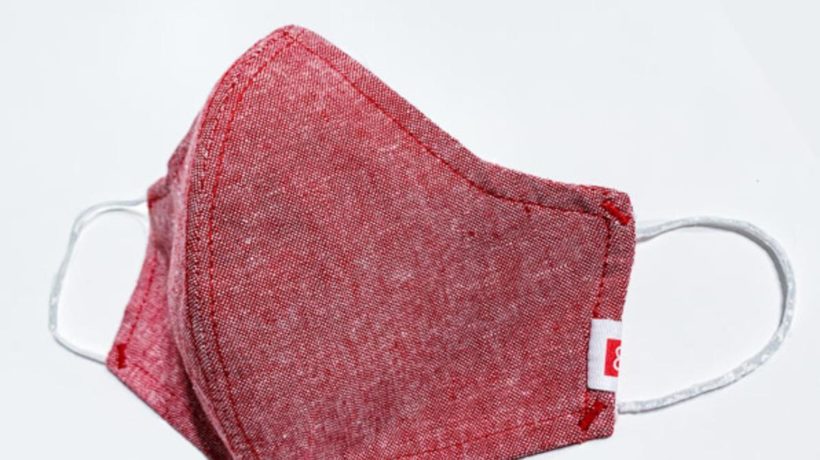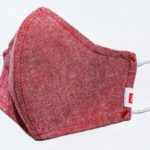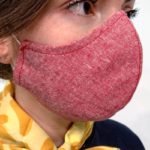Ellen Bennett felt like she was flailing last week. The owner of Hedley & Bennett worried about how quickly the coronavirus was spreading and was concerned about how she was going to keep paying her 30 employees if the economy shut down. Then, on Friday, she saw that designer Christian Siriano had started making masks to tackle the shortage of medical supplies. “It was like someone flung a brick at my head,” Bennett says. “I’ve always been a wake-up-and-fight kind of a girl. And I thought, ‘This is game time.’”
Hedley & Bennett is one of several fashion and apparel brands pivoting their businesses to start making personal protective gear. Hanes, the American conglomerate known for its cotton underwear, announced it would retrofit its manufacturing operations to produce masks. Siriano is using his team of 10 seamstresses to make masks full time. And Dov Charney, the former head of American Apparel and founder of Los Angeles Apparel, has deployed his company’s manufacturing facilities to start producing masks and gowns. Smaller labels, such as Michael Costello and Karla Colletto Swimwear, have also announced they will make masks.
Bennett owns a factory in Los Angeles that makes high-end aprons for consumers as well as restaurant workers. She’d already sent her employees home to comply with California’s order that nonessential businesses close. But on Friday, she called her head of design along with some seamstresses to see how they could use their materials to start making masks. She also called up a family friend, Robert Cho, who’s the chief of staff for Shriners for Children Medical Center in Pasadena. Together, they developed a prototype for a mask in a single day, then moved to start mass-producing it.
DESIGNING A CORONAVIRUS MASK
Over the last few months, the global medical community has decried the shortage of N95 masks, which are the gold standard because they’re able to filter out tiny particles, including the coronavirus. “These are the masks that should be going to doctors in COVID wards who are at the front lines of this crisis,” says Cho. “These are doctors who are at high risk because they know they will be in environments where they will be exposed to the virus.”
While Hedley & Bennett’s masks aren’t medical grade, Bennett envisions them for people in less risky circumstances who still have to interact with others on a daily basis, such as those working in warehouses or commercial kitchens. She has close relationships with the food industry, since she supplies these businesses with her aprons, and over the last week, she’s seen how many cooks, farmers, and grocers have continued working in industrial kitchens without any protective gear. Those people don’t need N95 masks but could use an additional layer of protection to limit their exposure.
“If you’re in a workplace where people are already six feet apart and sick workers have been asked to stay home, or if you’re going to a grocery store and practicing social distancing, your risk is relatively low,” says Cho. “In these scenarios, you should not be using an N95 mask that should be in the hands of a doctor in a COVID ward.”


To that end, Bennett’s mask is ergonomically designed to fit over your nose and face. It’s made from chambray, a breathable fabric that withstands a lot of washing, with an inner layer of a polyester-blend fabric that feels soft against the skin. But breathability means that particles from the outside world are able to enter the fabric. So in order for this mask to work effectively, you must insert a HEPA (high-efficiency particulate air) filter into a pocket around the nose and mouth area. Any filter that meets the HEPA standard must remove at least 99.97% of particles whose diameter is equal to 0.3 micrometers. This would include the coronavirus.
In spite of the current N95 shortage, there is no shortage of HEPA filters on the market, since they’re used in a wide range of industries. But if you can’t find these, you can even use a new vacuum cleaner filter. In each of these cases, you would simply cut the filter to fit the shape of the mask’s pocket. (Hedley & Bennett is making the pattern of this insert available online, so people can print it out and use it at home.)
Cho says that while cloth masks feel good against the skin, they can also trap germs. So it’s crucial that people be able to wash the masks regularly—ideally after every single wear—so they stay hygienic. “We would recommend that you wear the mask to your shift or to the grocery store, then take it off when you come home, throw the filter into the trash, and immediately put the mask in the washing machine,” Cho says.
PROTECTING ESSENTIAL WORKERS
After the mask was designed, Hedley & Bennett immediately started producing them. The masks are available for the general public to purchase; for every $22 mask bought, one will be donated. Hedley & Bennett will distribute these masks for free to organizations that have put out calls for them, and it invites people to request masks on its website. There is also the option to pay $22 and donate both masks.
The company has implemented a range of new protocols at its factory, including having a team member at the door take people’s temperatures as they come in. The company has 40 sewing machines in the building, but the 10 people who sew are spread out so that they’re at least six feet apart. Workspaces are cleaned with disinfectant regularly.
While the vast majority of apparel production has shifted overseas, Bennett says companies like hers that make their products in the United States can be more nimble. “I have seamstresses on hand ready to work and lots of supplies we can use right now,” Bennett says. “The key is being able to design a mask quickly and get it out as fast as we can.”
Cho says that he hopes a program such as this will free up more N95 masks to go to the doctors who really need them. And over time, he hopes that brands such as Hedley & Bennett can expand into making other kinds of protective equipment—gowns, for instance. “We are totally unprepared for this crisis,” says Cho. “My colleagues are already running out of masks and gowns. It feels like we’re in a time of war, and any brand that can pivot to making these essential items should absolutely do this.”
Right now, Bennett has hired 10 of her sewers to make 2,000 masks a day, but as demand grows, she hopes to scale up. She says she has a large stock of fabric on hand that she will use to make these masks. “It would be amazing if there was enough demand for me to hire more sewers to make something that the country desperately needs right now,” Bennett says.
Originally published on fastcompany.com.









